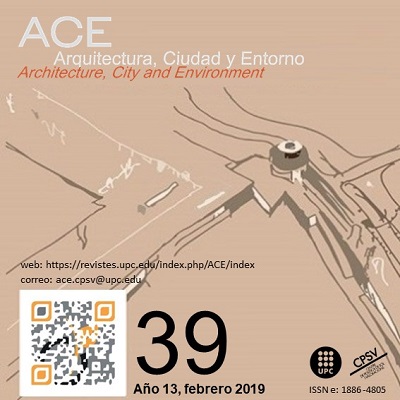Good living and Spatial Planning, a socio-ecological transition under construction
DOI:
https://doi.org/10.5821/ace.13.39.5357Keywords:
Development, ecosystem approach, territorial complexityAbstract
Objective
Countries like Bolivia and Ecuador expose Good Living (GL), from the rejection of the current model of development with a disruptive and under construction vision, open to Latin America. They propose a socio-ecological transition based on the harmonious relationship between society and nature. The Constitution Ecuador exposes nature as a subject of rights, along with humans. It proposes the eco-systemic approach (EA) as a methodology of boarding for the territorial study. However, their National Plans, which claim Land Management (LM), show traditional forms of planning. They are inappropriate because of the paradigmatic condition of the GL. The objective of this work is to propose a relational theoretical construct to save the socio-ecological commitment of the GL, without repeating structures typical of the current development model.
Methodology
It is inquired on fundamental conceptions of the GL, the EA and the theory of the complexity, to orient an epistemic frame of LM for the GL. The proposed discussion aims to generate possibilities for the practical transfer of the GL with methodologies according to this new paradigm, in order to reduce the local territorial vulnerability to transformation processes in different scales.
Conclusions
A conceptual relational framework or "construct" of LM of the BV is exposed, which presents the possibility of facing the current model of development, from the disruptive logic. The debate urges to infer that sustainability cannot be achieved within the framework of capitalist inequality.
Originality
The theme is interesting and original, as it is a radical alternative to the capitalist model of development, of applicability for different territories.
Downloads
Published
Issue
Section
License
| INTELECTUAL PROTECTION CRITERIA |
At this moment, it is count with the "Oficina Española de Patentes y Marcas", while global protection it is being processed by the World Intelectual Property Organization (OMPI/WIPO). Nevertheless the International Standard Serial Number Office (ISSN) has given the following numbers ISSN: 1886-4805 (electronic version) and 1887-7052 (paper version). All articles will be peer reviewed, using double blind reviewing. |
| COPYRIGHT |
The article contents and their comments are authors exclusive liability, and do not reflect necessarily the journal editor commitee's opinion. All ACE published works are subject to the following licence CC BY-NC-ND 3.0 ES http://creativecommons.org/licenses/by-nc-nd/3.0/es/ It implies that authors do not hold nor retain the copyright without restrictions but only those included in the licence. |





































